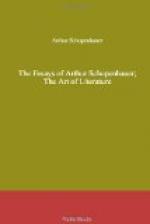Consider, further, the wonderful romances of Jean Paul, and how much inner life is shown on the narrowest basis of actual event. Even in Walter Scott’s novels there is a great preponderance of inner over outer life, and incident is never brought in except for the purpose of giving play to thought and emotion; whereas, in bad novels, incident is there on its own account. Skill consists in setting the inner life in motion with the smallest possible array of circumstance; for it is this inner life that really excites our interest.
The business of the novelist is not to relate great events, but to make small ones interesting.
History, which I like to think of as the contrary of poetry [Greek: istoroumenon—pepoiaemenon], is for time what geography is for space; and it is no more to be called a science, in any strict sense of the word, than is geography, because it does not deal with universal truths, but only with particular details. History has always been the favorite study of those who wish to learn something, without having to face the effort demanded by any branch of real knowledge, which taxes the intelligence. In our time history is a favorite pursuit; as witness the numerous books upon the subject which appear every year.
If the reader cannot help thinking, with me, that history is merely the constant recurrence of similar things, just as in a kaleidoscope the same bits of glass are represented, but in different combinations, he will not be able to share all this lively interest; nor, however, will he censure it. But there is a ridiculous and absurd claim, made by many people, to regard history as a part of philosophy, nay, as philosophy itself; they imagine that history can take its place.
The preference shown for history by the greater public in all ages may be illustrated by the kind of conversation which is so much in vogue everywhere in society. It generally consists in one person relating something and then another person relating something else; so that in this way everyone is sure of receiving attention. Both here and in the case of history it is plain that the mind is occupied with particular details. But as in science, so also in every worthy conversation, the mind rises to the consideration of some general truth.
This objection does not, however, deprive history of its value. Human life is short and fleeting, and many millions of individuals share in it, who are swallowed by that monster of oblivion which is waiting for them with ever-open jaws. It is thus a very thankworthy task to try to rescue something—the memory of interesting and important events, or the leading features and personages of some epoch—from the general shipwreck of the world.
From another point of view, we might look upon history as the sequel to zoology; for while with all other animals it is enough to observe the species, with man individuals, and therefore individual events have to be studied; because every man possesses a character as an individual. And since individuals and events are without number or end, an essential imperfection attaches to history. In the study of it, all that a man learns never contributes to lessen that which he has still to learn. With any real science, a perfection of knowledge is, at any rate, conceivable.




